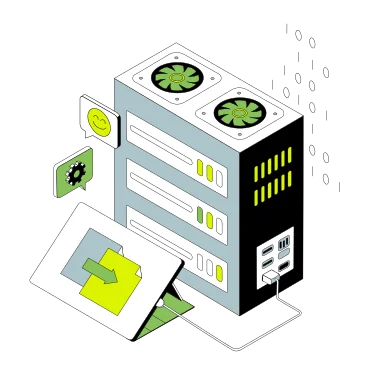Shared hosting is a popular and affordable option for hosting websites, but as a website grows and attracts more traffic, it may be necessary to consider upgrading to a Virtual Private Server (VPS).
Here are some reasons why and when a website should be migrated from shared hosting to VPS:
1. Increased traffic

As a website grows and attracts more traffic, it may start to outgrow the resources provided by shared hosting. If your website is experiencing slow loading times or frequent downtime due to traffic, it may be time to consider upgrading to a VPS.
2. More control
Shared hosting provides a limited amount of control over the server and its resources. With a VPS, you have greater control over the server and can install custom software, configure the server to your needs, and have your own IP address.

3. Better performance

VPS can provide better performance than shared hosting, especially for websites that receive a lot of traffic or have resource-intensive applications. With a VPS, you have dedicated resources and can fine-tune the server to optimize performance.
4. Greater security
Shared hosting can be less secure than a VPS, as you share the server with other websites. With a VPS, you have your own isolated environment, which can provide an additional layer of security.

5. Custom requirements

If your website has specific requirements, such as the need to run custom applications or the need to store a large amount of data, shared hosting may not be sufficient. A VPS can provide the resources and flexibility you need to meet these custom requirements.
Conclusion
In general, a website should be migrated from shared hosting to a VPS when it starts to outgrow the resources provided by shared hosting and requires more control, performance, security, or custom requirements. While a VPS may be more expensive than shared hosting, it can provide the resources and flexibility needed to support the growth and success of a website.
Frequently Asked Questions
The primary difference lies in the allocation of resources and the level of control. Shared hosting involves multiple websites sharing the same server resources, often leading to limited access and control over server settings. In contrast, VPS provides dedicated resources to each user and offers more control over server configurations.
Signs that your website has outgrown shared hosting include slow loading times, frequent downtime, inability to install custom software or run certain scripts, and receiving notifications from your hosting provider about exceeding resource limits.
Upgrading to a VPS offers numerous benefits, including improved website performance, higher reliability, increased security, the ability to customize your server environment, and scalability to easily adjust resources as your site grows.
Yes, upgrading to a VPS can positively impact your website’s SEO. Faster loading times, better uptime, and the ability to implement SSL certificates more seamlessly can improve user experience and search engine rankings.
Managing a VPS requires a moderate level of technical knowledge, especially for unmanaged VPS hosting. You should be comfortable with command-line interfaces and have a basic understanding of server management. However, many hosting providers offer managed VPS services, which include technical support and server management.
Yes, most hosting providers offer an upgrade path from shared hosting to VPS. It’s usually a straightforward process, and in many cases, the hosting provider will assist with the migration to ensure a smooth transition.
VPS hosting is generally more expensive than shared hosting due to the dedicated resources and additional features it offers. However, the cost can vary widely depending on the provider, the resources included, and whether you choose a managed or unmanaged plan.
While it can be done at any time, the right time to switch is typically when your website begins to experience the limitations of shared hosting, such as performance issues or when you require more control and flexibility. Planning the switch in advance can help ensure a smooth transition with minimal downtime.
Look for a provider that offers reliable uptime, scalable resources, robust security features, quality customer support, and the choice between managed and unmanaged services. It’s also beneficial to choose a provider with a good reputation and positive reviews from other users.
Tutorial Video
